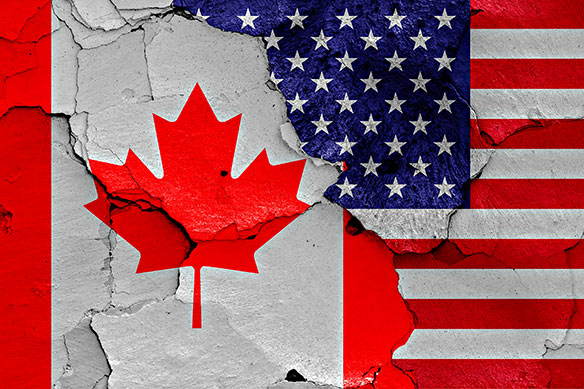
Power of the people Consumer choice trumps America First
Exclusive
BRETT WALKER
[In the wake of the NATO Summit in Brussels and the apocalyptic meeting with Russian president, Vladimir Putin, Brett Walker offers a timely and insightful commentary in this week’s issue of Canadian Travel Press on what Donald Trump’s “America First” trade policy could mean for the travel and tourism industry, and the critical role that consumer choice will have as things play out.]
Donald Trump’s exhortation of “America First” and all the debate around NAFTA might have some in the travel industry wondering: how does this affect me?
Quite likely much more than you think.
While few, if any of us, will have a smidgen of influence on any future trade agreement; tourism as a whole plays a very important role in trade. Yet, your industry and mine, our business interests and our personal and collective futures are rarely mentioned in any political or even economic discourse. Perhaps because of this fact, or in light of it, the media has yet to engage with issues related to it.
Though previous US administrations have taken exception to some of NAFTA’s perceived inequities, none have been so emboldened to denounce, not only NAFTA, but the notion of free trade itself.
Adam Smith be gone.
The pointed attacks and subsequent tariffs by President Trump on Canada’s aluminum and steel industries are sure to have a stifling effect on Canadian manufacturers.
Trump’s invective is now focused on Canada’s dairy farmers which, he believes, are advantaged from a protectionist and anti-competitive supply management system.
On this, he could be right; although there’s no mention of the tens of billions of dollars of direct and indirect subsidies US dairy farmers receive from the US government every year.
Building barriers
Trump’s justification for increasing US tariffs is to provide barriers to foreign goods imported and consumed by Americans. He feels leveraging the strength of the US consumer market along with the prodigious and controlling interests US corporations have around the world, will generate more US production, jobs, boost exports and thereby lessen the current US trade deficit.
Trump is continually opining “America first,” and his protectionist policies are largely how he plans to do it. The strategy is to maintain the upper hand in US-controlled markets rather than rely on the invisible hand of freer markets.
The US can and does wield great power directly or indirectly on commercial, as well as political interests, across the globe. All corporations require some access, whether or not equitable, to the largest consumer market in the world to be successful.
Numerous foreign governments are heavily indebted to the US for joint security, protection, and/or aid. Global institutions such as the WTO and IMF, rely heavily on US for funding and relevance and over half the global foreign exchange reserves are held in USD.
Any retaliatory tariff or other economic impediment to the US can have significant and, most often, greater detriment on the imposing country and its integrated markets than on the US itself.
Foreign governments are, therefore, wary to do anything of the sort.
Perishable service, enter tourism
A highly discretionary and perishable service. Perishable because what’s not used today cannot be sold tomorrow.
Discretionary, because consumers choose, not only, whether to consume it or not, but what and where to consume the services if they do.
It’s a vitally important industry with enormous direct and indirect benefits on everything from current accounts, employment, investment, education, and shared awareness of global issues.
Tourism contributes significantly to GDP and, for many countries, overwhelmingly so. Some figures are over/under-reported and others uncorroborated, but whatever the figures, they’re big.
Tourism is also an anomaly from most others goods and services of trade.
Any outbound visitation is considered an import to the contributor (resident) nation and an export to the recipient nation.
Think about it
When Canadians travel from one country to another, we are essentially “visitor exports” and that’s often how we’re documented. We consume the services of that country in that country. In doing
so, we are paying for those services through an exchange of funds. This exchange of funds amounts to a deficit on Canada’s current account; just as if funds were exchanged for goods or services imported to Canada. This enhances the foreign exchange reserves of the recipient country and diminishes our own.
Billions & trillions
Visitor exports are an increasingly important metric by which any balance of trade can be conceived between countries and likely the most intractable one. Its power is wielded by the whim of a people. Any attempt to subjugate or control them has powerful reciprocating effects. The billions, even trillions of dollars’ worth of tourism related services consumed every year is amassed through incalculable individual choices.
Tourism is highly transferable, highly accessible, highly elastic, highly procurable, and highly emotional. The source of this touristic and commercial exchange is strictly in the control of the people. Each and every one of us, our clients and ourselves.
The US administration may not associate Canadian visitor exports with the value of manufactured goods, agriculture and other boxcar items exchanged between Canada and the US, but they should.
By the US International Trade Administration’s report, Canadian visitor spending in the US was $19.8 billion in 2016, a sharp decline of 13% from the prior year.
Historically, it’d be surmised, and arguably so, such a decline is the inevitable result of unfavourable rates of exchange for Canadians.
However, it might not just be the cost of money that’s keeping Canadians at bay.
Where’s the welcome?
Objectifying anyone as “spoiled” and responding to honest, political discourse as “going to cost a lot of money for the people of Canada” isn’t really rolling out the red carpet for Canadians.
It’s perhaps not just Mr. Trump who doesn’t understand or consider our industry when indeed politicians and all other observers and media should.
Tourism is almost unrivalled in the democratization of consumer choice.
Consumers are increasingly choosing to spend their money and provide support where they feel it’s justified, and it amounts to a lot of money.
What’s more, tourism can’t be lured by political might or economic leverage. It’s lured by a desire to experience and belong.
(www.export.gov/article?id=Canada-Travel-and-Tourism)
Brett Walker is the general manager of Collette in Canada. He’s also the vice-chairman of the Canadian Association of Tour Operators (CATO) and was recently named the vice-chairman of the Travel Industry Council of Ontario (TICO).


